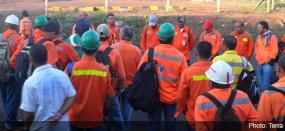Work at La Caypa coal mine in northern Colombia resumed after police broke up an "illegal" strike, confirmed Pacific Coal in a statement released Monday.
The mine, in Guajira Department, had been blockaded on 22 January with heavy machinery by subcontracted workers, in an apparent dispute between the subcontracted company OPM and the workers' union. Pacific Coal asserted in an earlier statement that they had no part in the dispute, which also involves ongoing legal action.
The Canadian company declared the strike illegal on the basis of, "retaining private property (mining equipment and infrastructure), occupation of private premises, and blocking the mine."
Work resumed on Saturday morning after the local Barrancas municipality authority issued an order for unauthorized personnel to clear the area, which local police enforced.
Pacific Coal confirmed that police will remain stationed at the mine throughout the week folllowing the resumption of work.
Sources : Colombia Report
Miners’ Strike Violently Repressed

Miners at the Caypa coalmine in La Guajira, northern Colombia have been on strike since January 27th in protest at poor pay and conditions. The strike exemplifies how complex labour relations have become in Colombia, and how the government does not act to mediate, but rather takes the employers side in most disputes.
The Caypa mine is a highly profitable coalmine which produces some 2 million tonnes of coal per year, making 160 million USD. The mine is owned by Carbones Colombianos del Cerrejon, which contracts the operation of the mine to Obras Proyecto Mineria (OPM), which in turn subcontracts employment to Gente Estrategica (GE) and Gente Caribe (GC). These two companies employ 240 miners and other workers that work in the mine. Some of the workers have been subcontracted, without any contractual stability, for more than 15 years.
Miners in Caypa earn less than 50% of workers in other mines in the region, they are not paid overtime, and they work 8 days in shifts of 12 hours, followed by 3 days rest. Workers point out that health and safety leaves much to be desired with accidents being commonplace enough that they are requesting an on-site ambulance (the mine is 12 kilometres by dirt road from the nearest town). Furthermore, they complain that they are given poor quality food. These exacerbate the lack of job security the miners suffer thanks to their being subcontracted.
The dispute began on October 1st 2011, when the SINTRAMIENERGETICA union presented the workers’ demands. Negotiations facilitated by the Ministry of Labour began at the end of November, and ended on the 7th of January when the employment agencies (GE and GC) pulled out of the negotiations arguing that since they are merely contractors they cannot regulate pay and conditions in the mine. On the 2nd of January 25 unionised workers were sacked. Taken together this led to the workers voting for strike action on January 16th 2012.
The SINTRAMIENERGETICA union argues that the root of the problem lies with Carbones de Colombia since they own the mine, which OPM merely operates. However, Carbones de Colombia refuses to engage in talks. Furthermore, the Ministry of Labour inspectors haven’t even been allowed into the Caypa mine, but instead of taking action against the owners, the Ministry has requested that the riot police break up the strikers’ pickets.
The ESMAD riot police violently repressed the strike on Sunday, using tear gas and batons to try to disperse the workers. One worker, Luis Jorge Torres has been hospitalised.
The situation demonstrates how the tangled web of employers, owners and subcontractors serves to prevent workers’ legitimate rights from being fulfilled. Blame is passed around endlessly while the Ministry that is meant to mediate disputes ignores abuses by owners, and fails to carry out its constitutional role. This is in direct violation of Colombia’s international obligations, including those undertaken in April 2011 when Colombia signed up to the Labour Action Plan as part of the signing of the Free Trade Agreement with the United States.
Sources : Justice For Colombia, January 30th
